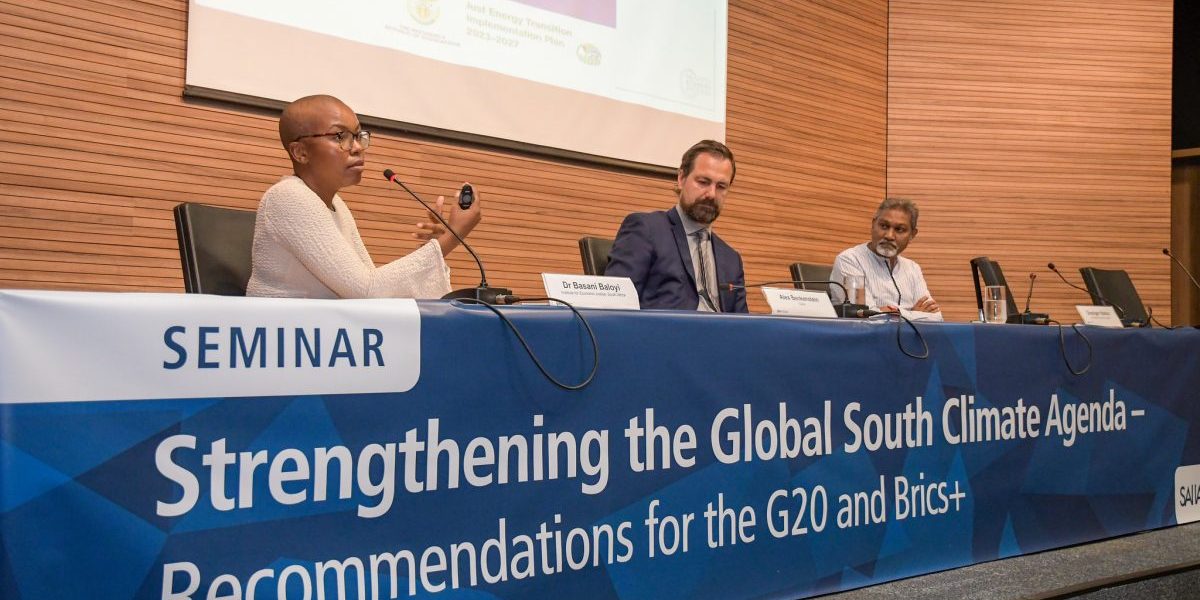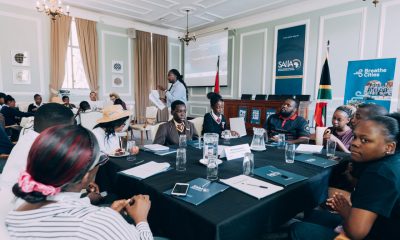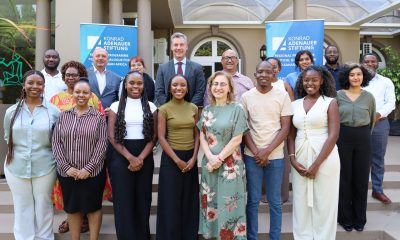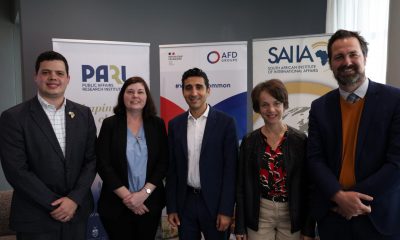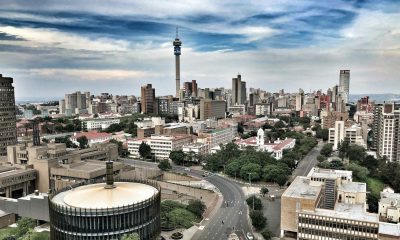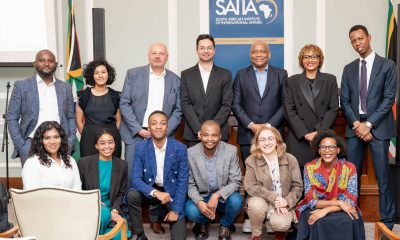SAIIA and the Brazailian Institute of Applied Economic Research (Ipea) co-hosted a Think20 side event in Brasilia on 8-9 April 2024. Titled ‘Strengthening the Global South Climate Agenda: Recommendations for G20 and BRICS+’, the event saw researchers from SAIIA’s Global South Climate Network present their research on loss and damage and green technology from and share comparative perspectives on the just transition journeys of Brazil and South Africa.
Brazil hosts the G20 this year and will hand over to South Africa for 2025 before chairing the BRICS+ and convening COP30. Our side event sought to make direct input into the drafting of the Think20’s recommendations to the G20 on climate and the just transition.
Head of SAIIA’s Climate and Natural Resources Programme, Alex Benkenstein, and Outreach and Partnerships Manage, Luanda Mpungose, joined deputy director of Ipea, Dr Claudio Amitrano to open the two-day event. Dr Amitrano highlighted the Global South’s particular challenges with climate change, being especially vulnerable to climate disaster and at the same time struggling to access the finance necessary to build resilient societies. This message was echoed by Mr Benkenstein who framed the next day’s proceedings as a forum for addressing this historical marginalisation of the South through new policy proposals from Southern thinkers.
Ms Mpungose went on to give the audience a brief background to the Global South Climate Network, of which SAIIA serves as convenor. Supported by the African Climate Foundation, the Global South Climate Network has emanated from the understanding that research from the Global North is still driving climate discourse while researchers in the Global South are placed better to articulate the climate concerns and needs of the South. The network is a new platform to profile the critical research and innovative policy approaches emerging from the Global South. It is split into two main working groups: Loss and Damage and Green Technology. Co-chairing Loss and Damage is Dr Abla Abdel-Latif, Executive Director of the Egyptian Centre for Economic Studies and Professor Jorge Chediek, Visiting Professor at the Catholic University of Argentina and former Director at the UN Office for South-South Cooperation. Dr Karim El-Aynaoui, Director of the Policy Centre for the New South, and Dr Nagesh Kumar, Director of the Institute for Studies in Industrial Development co-chair the Green Technology Working Group.

Day one of the side event gave the network the opportunity to prevent its first research papers. Professor Pilar Rubial Bueno from the climate research institute Argentina 1.5 presented a policy briefing on Loss and Damage while Dr Humphrey Njogu (Kenyan Institute for Public Policy Research and Analysis) and Dr Chuanhong Zhang (China Agricultural University) presented two policy briefings for Green Technology. The subsequent discussions were rich with feedback for all three policy briefing authors and additional recommendations for how the G20 and BRICS+ platforms can be leveraged to amplify Global South research and perspectives on loss and damage and green technology transfer and access.
Day two of the side event focused closely on South Africa’s just energy transition and what lessons can already be drawn from our experience for other countries in the Global South. Brazil’s Ecological Transformation plan was referenced throughout the discussion, driven by Dr Ivan Oliviera of the Ministry of Finance for Brazil. Dr Oliviera drew on comments made on Day 1 by Ana Toni, National Secretary for Climate Change in the Ministry of Environment of Brazil, to share how the Brazilian government is using its G20 presidency to advance climate action, particularly through the G20 Taskforce for the Global Mobilization Against Climate Change. The G20 under Brazil is committed to addressing the difficulties developing countries face in accessing climate finance and attracting sustainable investments to accelerate their development. His interventions set up the presentations by Dhesigen Naidoo (Presidential Climate Commission) and Dr Basani Baloyi (Institute for Economic Justice) well. While both Mr Naidoo and Dr Baloyi reflected on the social dimensions of the energy transition in South Africa, Dr Baloyi made particularly poignant remarks related to the threats to justice that can emerge if private and not public interests are foregrounded. Mr Naidoo highlighted the natural and strategic partnership between Brazil and South Africa on climate issues, arguing that with maturity, this relationship can see green development as its result. Rounding out the discussion was a lively intervention from the CEO of the HSRC and interim chair of the SA BRICS Think Tank, Professor Sarah Mosoetsa, who painted a picture of the specific considerations of the Mpumalanga province in South Africa for the Brazilian audience, noting that the coal producing region will need special attention as the transition unfolds, in order to not leave anyone behind.
SAIIA plans to present the Think20 secretariat with a list of key proposals drawn from the fruitful discussions in Brasilia to amplify Global South perspectives on these critical issues.
Ms Luanda Mpungose together with climate researcher Ms Jordan Mc Lean were received at the South African embassy in Brasilia by Ambassador Vusi Mavimbela. They briefed the ambassador on SAIIA’s work with Brazilian think tanks and on climate, energy and the just transition and also heard about the embassy’s work in Brazil, supporting business and knowledge exchange between the two regional powerhouses.
More work by SAIIA on the G20, climate change and the Just Transition can be found here:
- G20 toolkit: https://saiia.org.za/g20-toolkit/
- G20 and energy transitions: https://saiia.org.za/research/how-can-the-g20-support-africas-energy-transition-and-sustainable-financing-priorities-and-concerns/
- Energy transitions sub-theme on website: https://saiia.org.za/thematic-area/climate-change/energy-and-just-transition/

